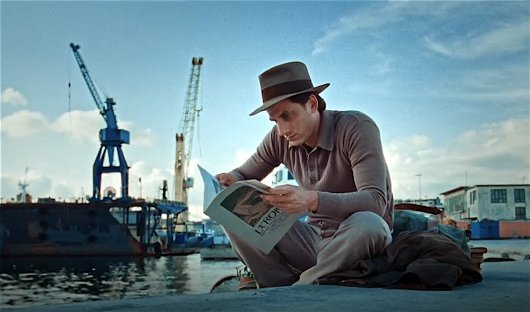
 Transposing Jack London’s autobiographical novel to Italy, Pietro Marcello highlights the conflict of socialist idealism with the individualistic drive that culminates in fascism.
Transposing Jack London’s autobiographical novel to Italy, Pietro Marcello highlights the conflict of socialist idealism with the individualistic drive that culminates in fascism.
Jack London was a man of contradictions. An adventurer who became early 20th century America’s most popular author, he’s remembered today mainly for his stories of the Klondike gold rush, especially “The Call of the Wild.” What people don’t remember is that he was a radical socialist, and a labor rights activist who had frequent run-ins with the law. Yet his socialism was tempered by Nietzschean ideas about will power, and he advocated the now discredited doctrine of eugenics. Most of all he feared the suppression of creativity by the state, and his argumentative nature on these subjects sparked some conflict in left wing circles of that time.
His contradictions were on full display in his autobiographical novel “Martin Eden,” published in 1909. It was a sensation in its day, and there were a couple of Hollywood movies made from it. Recently, in 2019, Italian director Pietro Marcello adapted it in a film that transposed the story to Italy—despite that they retained the original title: Martin Eden.
Luca Marinelli stars in the title role. His Martin Eden is a muscular, handsome sailor who conveys remarkable power and energy in his manner and actions. The movie opens with him rescuing a young man from a severe beating on the docks. The boy gratefully invites Martin to dinner with his family, who turn out to be fabulously rich landowners. He immediately falls for the boy’s older sister Elena, played by Jessica Cressy: beautiful, university educated; she inspires him to try to elevate himself through reading, and eventually writing. After much struggle and failure, he does publish some stories, and gains fame as a writer, but the class difference between him and Elena still constitutes a barrier.
Turning this American story into an Italian one creates some interesting effects. The contrast between the old world aristocracy of Elena’s family and the working people championed by Martin is more clear-cut than the class conflict as experienced in the U.S. The movie seems to be set in the 1920s during the rise of fascism in Italy, but the chronology gets blurred so at times we seem to be in the post-Second World War period. I even spotted a television in someone’s home in one scene, which threw me off, but I think Marcello and his co-screenwriter Maurizio Braucci want to identify Martin’s drama generally with the first half of the twentieth century because of the ideas expressed rather than the historical specifics. However, the references to the fascism of Mussolini’s time are important and unmistakable.
Martin’s initiation into radical politics comes through an older man, a socialist thinker played by Carlo Cecchi. But Martin’s belief in the importance of personality causes him to rebel against his mentor’s ideas. After becoming a leftist hero, he disappoints them with his individualist speeches, while his criticism of the upper classes makes it impossible for Elena’s family and other conservatives to approve of him. Martin’s charisma, boldly conveyed by Marinelli’s outsized performance, becomes a vision of how idealism can turn into a cult of the strong man, which nurtures fascist movements. His increasingly strident pronouncements reflect a man who has lost his way. The only way out, it seems, is to return to the beginning, to the simple elemental life of a sailor.
The tragedy of Martin Eden, in this film version at least, is that of our times, when hope has time and again been defeated by disillusionment. The struggles within the mind and heart of a brilliant young writer echo the irreconcilable forces of our world.

